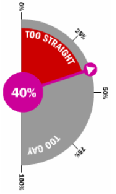how the thesis is progressing
i promised to talk about my thesis in a previous entry. when i first started thinking about a thesis problem to work on, of course i was not set to save the world. keep it 'smart' was what a former professor and idol said: simple, measurable, achievable, reasonable, and tolerable. at that time, i didn't know what she meant by those words, but now i am starting to understand.
anyhoo, i am working on measuring the different costs that households of different income-assets levels incur in accessing various services and resources. my hypothesis: people are poor because they do not have access to the services and resources they need to enable them to get out of poverty. accessibility has always been mentioned as an aspect of poverty, but it is seldom measured, and if it is, most often than not, the measurements are based on flimsy assumptions.
to do my research, i went to the south of the philippines, in an agricultural community found in the mountainous region of northern mindanao. in the study area, i grouped the households by income and assets class (high, middle, low) to compare their different travel costs and then to check if the differences are statistically significant (at alpha level 0.05). the actual travel distance traversed by people to get to the services and resources they need to sustain their livelihoods were measured in the field using global positioning system (gps) receivers. i rode the different transport modes that they actually use: animal cart, motorbike, jeep, and walking (!). using newly-developed algorithms for transport/accessibility analysis in geographic information systems (gis), my aim is to have a field-level and more accurate measurement of accessibility costs (in travel time and fare units).
i am not yet finished with my analysis, but partial results show that poor households in the study area incur higher costs in getting to their destinations compared to relatively richer households. and the differences i found are (statistically) significant!
this may seem trivial to some, but what i aim to prove in this study is that there is an empirically high correlation between accessibility and poverty. at a time when the prudent use of development fund is more important than ever, the methodology that i used can be applied to improve the identification of areas that require livelihood assistance as well as to provide better recomendations for building roads and infrastructures in rural planning. it can also be used to identify locations which are vulnerable to natural disasters and to effectively plan mitigation measures for such future events.
i know that ending poverty is a long shot from what i am studying, but i believe that it can be addressed if people would have improved access to services and resources.
maybe this is a side of me that i seldom share in this blog because what i usually write about are my heartaches, and lately my heart-gains. but this is my real passion: working with the rural-poor in the mountains towards poverty alleviation in ways that a geek like me can.
indeed i am geeky, but i try to connect my brain to my heart.
listening to: myself spit the seeds while eating a sweet and juicy slice of watermelon from almeria, spain ;)
this is marc's version of the truth, sometime at 6:09 PM
![]() if you can't live with it, he can.
if you can't live with it, he can.


0 Comments
Post a Comment
« Home